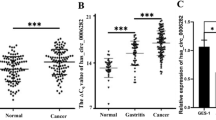Abstract
Background
The replication protein A3 (RPA3) is a component of the RPA protein complex, which plays an essential role in multiple processes of DNA metabolism.
Aims
However, the involvement of RPA3 in gastric cancer tumorigenesis has not yet been investigated.
Methods
We stably knocked down RPA3 expression using short hairpin RNA in AGS cell line, and performed cell growth, colony formation and soft agar assays. Xenograft experiments were performed to examine tumor promoting properties of RPA3 in vivo. The qRT-PCR and immunohistochemistry were performed to evaluate RPA3 expression levels in 37 and 12 pairs of gastric cancer patient samples, respectively. Association between RPA3 expression and survival was evaluated in an independent cohort of 85 gastric cancer patients.
Results
Downregulation of RPA3 inhibited cell growth, clonogenicity and soft agar growth in AGS cells. Decreased expression of RPA3 significantly reduced tumor growth rate in AGS xenografts. In addition, RPA3 was upregulated in cancerous tissues compared with matched noncancerous adjacent tissues in gastric cancer patients. High expression of RPA3 was associated with poor patient survival.
Conclusion
Upregulation of RPA3 is involved in gastric cancer tumorigenesis and is associated with poorer patient survival. RPA3 represents a new therapeutic target of gastric cancer and serves as a potential prognostic biomarker for patient survival in gastric cancer.




Similar content being viewed by others
References
Siegel RL, Miller KD, Jemal A. Cancer statistics, 2016. CA Cancer J Clin. 2016;66:7–30.
Stratton MR. Exploring the genomes of cancer cells: progress and promise. Science. 2011;331:1553–1558.
Wood LD, Parsons DW, Jones S, Lin J, et al. The genomic landscapes of human breast and colorectal cancers. Science. 2007;318:1108–1113.
Greenman C, Stephens P, Smith R, Dalgliesh GL, et al. Patterns of somatic mutation in human cancer genomes. Nature. 2007;446:153–158.
Panani AD. Cytogenetic and molecular aspects of gastric cancer: clinical implications. Cancer Lett. 2008;266:99–115.
Iftode C, Daniely Y, Borowiec JA. Replication protein A (RPA): the eukaryotic SSB. Crit Rev Biochem Mol Biol. 1999;34:141–180.
Wold MS. Replication protein A: a heterotrimeric, single-stranded DNA-binding protein required for eukaryotic DNA metabolism. Annu Rev Biochem. 1997;66:61–92.
Wu Y, Lu J, Kang T. Human single-stranded DNA binding proteins: guardians of genome stability. Acta Biochim Biophys Sin (Shanghai). 2016;48:671–677.
Tomkiel JE, Alansari H, Tang N, Virgin JB, et al. Autoimmunity to the M(r) 32,000 subunit of replication protein A in breast cancer. Clin Cancer Res. 2002;8:752–758.
Dahai Y, Sanyuan S, Hong L, Di Z, Chong Z. A relationship between replication protein A and occurrence and prognosis of esophageal carcinoma. Cell Biochem Biophys. 2013;67:175–180.
Givalos N, Gakiopoulou H, Skliri M, Bousboukea K, et al. Replication protein A is an independent prognostic indicator with potential therapeutic implications in colon cancer. Mod Pathol. 2007;20:159–166.
Zhang L, Kim S, Jia G, Buhmeida A, et al. Exome sequencing of normal and isogenic transformed human colonic epithelial cells (HCECs) reveals novel genes potentially involved in the early stages of colorectal tumorigenesis. BMC Genomics. 2015;16:S8.
Zhang L, Komurov K, Wright WE, Shay JW. Identification of novel driver tumor suppressors through functional interrogation of putative passenger mutations in colorectal cancer. Int J Cancer. 2013;132:732–737.
Wobbe CR, Weissbach L, Borowiec JA, Dean FB, et al. Replication of simian virus 40 origin-containing DNA in vitro with purified proteins. Proc Natl Acad Sci USA. 1987;84:1834–1838.
Wold MS, Kelly T. Purification and characterization of replication protein A, a cellular protein required for in vitro replication of simian virus 40 DNA. Proc Natl Acad Sci USA. 1988;85:2523–2527.
Fairman MP, Stillman B. Cellular factors required for multiple stages of SV40 DNA replication in vitro. EMBO J. 1988;7:1211–1218.
Flynn RL, Zou L. Oligonucleotide/oligosaccharide-binding fold proteins: a growing family of genome guardians. Crit Rev Biochem Mol Biol. 2010;45:266–275.
Fanning E, Klimovich V, Nager AR. A dynamic model for replication protein A (RPA) function in DNA processing pathways. Nucleic Acids Res. 2006;34:4126–4137.
Oakley GG, Patrick SM. Replication protein A: directing traffic at the intersection of replication and repair. Front Biosci (Landmark Ed). 2010;15:883–900.
Choudhary SK, Li R. BRCA1 modulates ionizing radiation-induced nuclear focus formation by the replication protein A p34 subunit. J Cell Biochem. 2002;84:666–674.
Wong JM, Ionescu D, Ingles CJ. Interaction between BRCA2 and replication protein A is compromised by a cancer-predisposing mutation in BRCA2. Oncogene. 2003;22:28–33.
Bochkareva E, Kaustov L, Ayed A, Yi GS, et al. Single-stranded DNA mimicry in the p53 transactivation domain interaction with replication protein A. Proc Natl Acad Sci USA. 2005;102:15412–15417.
Sancar A, Lindsey-Boltz LA, Unsal-Kacmaz K, Linn S. Molecular mechanisms of mammalian DNA repair and the DNA damage checkpoints. Annu Rev Biochem. 2004;73:39–85.
Li L, Zou L. Sensing, signaling, and responding to DNA damage: organization of the checkpoint pathways in mammalian cells. J Cell Biochem. 2005;94:298–306.
Levidou G, Gakiopoulou H, Kavantzas N, Saetta AA, et al. Prognostic significance of replication protein A (RPA) expression levels in bladder urothelial carcinoma. BJU Int. 2011;108:E59–E65.
Author information
Authors and Affiliations
Corresponding author
Ethics declarations
Conflict of interest
None.
Additional information
Zhongming Dai and Shufang Wang are co-first authors.
Electronic supplementary material
Below is the link to the electronic supplementary material.
Rights and permissions
About this article
Cite this article
Dai, Z., Wang, S., Zhang, W. et al. Elevated Expression of RPA3 Is Involved in Gastric Cancer Tumorigenesis and Associated with Poor Patient Survival. Dig Dis Sci 62, 2369–2375 (2017). https://doi.org/10.1007/s10620-017-4696-6
Received:
Accepted:
Published:
Issue Date:
DOI: https://doi.org/10.1007/s10620-017-4696-6




